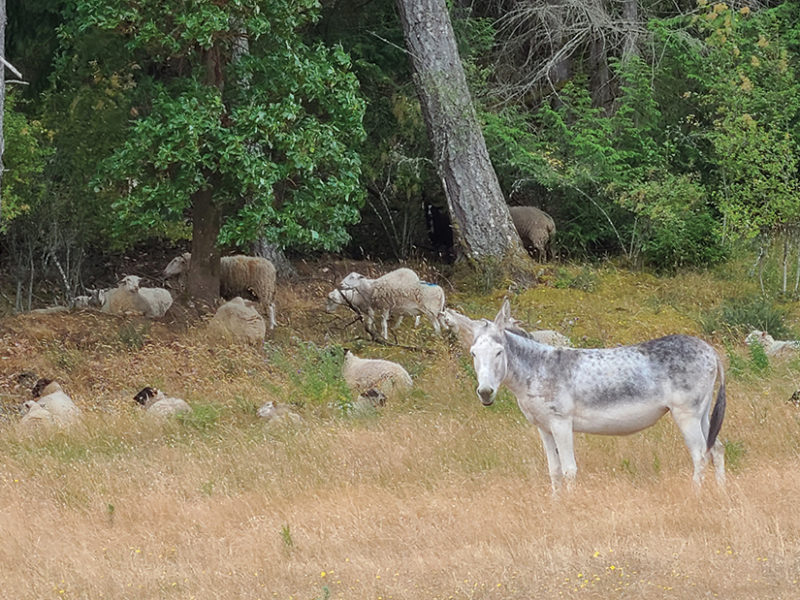METCHOSIN – A black bear has been killing sheep in the Metchosin area on Vancouver Island since July and unlike previous occasions, the BC Conservation Officer Service (COS) is stepping back and asking farmers to step up prevention efforts.
Twenty-one sheep from various farms have been killed to date. Ten of the bear kills were at John and Lorraine Buchanan’s Parry Bay Sheep Farm. An additional five sheep are missing.
“I believe four were chased into the ocean,” says John Buchanan. “One was found on the beach across the harbour. I don’t know yet how many of these will be paid for.”
Producers are eligible to receive compensation for most losses if it can be proven to the standard requirements for the provincial Livestock Protection Program.
Conservation officers have been called out to help but have not responded with assistance to remove the bear. The District of Metchosin sent a letter to the BC COS in mid-July and Metchosin mayor John Ranns was assured that conservation officers would dispatch dogs if a scent remained on the kill.
“Nobody has come out,” says Ranns.
A statement the BC Ministry of Environment provided Country Life in BC says the COS has been working with Metchosin farmers to minimize the number of sheep lost to bears and the number of bears killed.
“These strategies include educating farmers on best management practices regarding livestock, including installing an electric fence, locking up sheep in a barn overnight, regularly checking the condition of the herd and the use of livestock guardian dogs,” says the statement. “Proper livestock husbandry management is critical to help reduce predation and lessen livestock losses. If these practices are not followed, this can result in a wildlife conflict and the possible destruction of a bear that could have been prevented.”
The province says conservation officers have been active in Metchosin, responding to complaints and encouraging farmers to follow best practices to reduce conflicts.
“Conservation officers strongly encourage farmers to implement best practices to protect both livestock and wildlife,” the statement says. “Livestock management techniques are always encouraged to help prevent conflicts from happening in the first place.”
Donkey patrol
Buchanan has tried to comply with the recommendations, adding guardian donkeys to his flocks and electric fencing to some fields. He adds that guardian dogs would be difficult to manage in the semi-developed area of Metchosin.
“I do believe the donkeys help,” says Buchanan. “There was a cougar hanging around one field that had two small donkeys in it. That night it moved a couple of miles and killed a sheep with no donkeys present. When we had the kill and the lambs chased into the ocean in East Sooke, we moved a donkey out there. The pasture was large, and the bear came and killed one and took one away. We moved them to a smaller field and had no more problems. Now we have electric fencing there and the problem stopped.”
But the mitigation efforts aren’t cheap. Buchanan spent $2,000 to upgrade the fence and $500 on maintenance. The cost of three donkeys, feed and farrier is another $2,000. He figures it would be too expensive to electrify the entire 10 miles of fencing at all the holdings where he grazes sheep.
The Buchanans have the largest sheep flock on Vancouver Island, utilizing small leased pastures around the region, and providing infrastructure to the sheep community by running a small inspected abattoir.
“By far the biggest issue for me, though, is if we are pushed off pastures, that will reduce sheep numbers, and threaten the slaughterhouse and our ability to maintain the delivery of lamb to town. That is bad for the industry,” says Buchanan.
“On a brighter note,” he adds, “COVID-19 has increased our demand to a level that can maintain the business and allow me to buy when everybody has lambs.”
Traps better
The province’s statement adds that conservation officers rarely use tracking dogs when responding to bear conflicts, “as the circumstances in which they are effective are very limited and can pose additional safety risks to the public and officers. Live trapping using a variety of techniques is a much safer and effective option.”
The position the COS has taken has been frustrating for Ranns.
“Traps and snares have proven to not be effective in our community and run the risk of trapping bears that are not a problem,” says Ranns. “This is a problem that goes beyond the threat to our farming community. There is a concern for the public and our visitors who use our hiking trails, which are the main corridors that the bears use. These people are city people and not bear aware.”
Ranns is concerned that the bear will be back worse than ever in September, as he builds up fat stores for the winter.
Producers encountering predator kills of their flock are encouraged to call the Ministry of Environment RAPP Line for assistance at 1-877-952-7277 or #7277 on the TELUS Mobility network. To report a livestock predator loss, call 1-844-852-5788 and the Livestock Protection Program will provide verification and mitigation for cattle and sheep producers.


 SAWP requirements waived
SAWP requirements waived